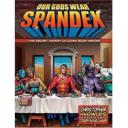 I’d been anticipating Christopher Knowles’ book Our Gods Wear Spandex for months, ever since it was first solicited in Previews. As the publisher’s description put it, the book would “trace the rise of the comic superheroes and how they relate to several cultural trends in the late 19th century, specifically the occult explosion in Western Europe and America.” Certainly the religious iconography of superheroes would be an interesting topic for a book, but Knowles’ book is largely just one long monotonous, idiosyncratic list of 19th and 20th century occultists interspered without a coherent thesis or idea in sight.
I’d been anticipating Christopher Knowles’ book Our Gods Wear Spandex for months, ever since it was first solicited in Previews. As the publisher’s description put it, the book would “trace the rise of the comic superheroes and how they relate to several cultural trends in the late 19th century, specifically the occult explosion in Western Europe and America.” Certainly the religious iconography of superheroes would be an interesting topic for a book, but Knowles’ book is largely just one long monotonous, idiosyncratic list of 19th and 20th century occultists interspered without a coherent thesis or idea in sight.
One could overlook the factual errors (no, Black Sabbath’s “Iron Man” was not an ode to the Marvel character as Knowles claims). One could even overlook Knowles’ odd interpretation of comics history — Knowles take on the persecution of William Gaines and EC comics, for example, is extraordinarily disingenous. But the real problem running throughout the book is that Knowles appears to be a true believer when it comes to all things occult.
For example, consider this hilarious gem from Knowles describing early Sumerian texts,
Other Sumerian texts and tablets detail the exploits of a pantheon of suspiciously human-acting gods. These are told in such detail that some observers, like linguist Zechariah Sitchin, claim they are not myths at all, but garbled accounts of a race of extraterrestrials that colonized the Earth and created humanity as its slave race.
I paid $19.95 for this sort of nonsense? Sitchin isn’t a linguist, he’s a fracking quack along the lines of Immanuel Velikovsky and Eric von Daniken (the Skeptic’s Dictionary entry on Sitchin pretty much covers his particular brand of idiocy).
Stretching things like that is bad enough, but in some cases Knowles simply misinforms to the reader. Take, for example, his entry on Edgar Cayce whom, among other things, was convinced that the Egyptian pyramids were built by the Atlantean civilization and that an Atlantean Hall of Records is located underneath the Great Sphinx. Both claims are sheer nonsense, but Knowles works in a subtle distortion to make it appear more convincing,
The ARE [Cayce’s Association for Research and Enlightenment] is more than a playground for spiritual tourists, however. Two of the world’s two most important and influential Egyptologists, American Mark Lehner and Egyptian Antiquities Minister Zahi Hawass, are closely associated with it. Given the eccentric views Cayce held on Ancient Egypt, these associations seem curious until seen in the context of all the esoteric intrigue that, even today, centers in and around Egypt.
The only thing curious here is Knowles’ disinformation. Lehner freely admits that he was originally attracted to Egyptology by an infatuation with Cayce’s claims in the early 1970s. But Lehner’s reputation as a top notch Egyptologist came precisely because he quickly abandoned his Cayce-influenced views when it was clear they were unsupportable by the actual facts. As Lehner told Nova,
And it’s no secret that when I went [to Egypt as a student in 1973] I myself was imbued with the ideas of lost civilizations and inspired by a man named Edgar Cayce. So I was in fact, myself, looking for the lost civilization and something called the Hall of Records.
Or at least those ideas were on my mind. To make a long story short, those ideas didn’t stand up against bedrock reality. And so then I was still fascinated by these pyramids and the Sphinx. Then I asked the question, well, what is the real story? What is the story that the site itself has to tell. And so that’s what sustained me and kept me out there in a kind of exploratory mode.
Whether Knowles is disingenous or just credulous, it doesn’t speak well for his research abilities. The rest of Knowles’ book is about as accurate and about as interesting. It reads like some fanboy with a credulous interest in mysticism let loose to tie in comic books — however tangentially — with predictable results.
Someday, someone may just write an interesting look at comic books and religion. Our Gods Wear Spandex, however, is not it.